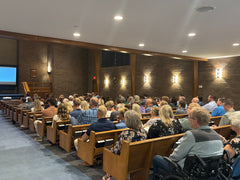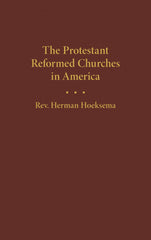Your cart is empty now.

The Bible and Israel (8)
“Through their fall (literally, “their transgression”) salvation is come unto the Gentiles” (11:11). The “transgression” here is Israel’s great sin in rejecting and crucifying the Messiah—only a hardened Israel could have committed such a gross transgression, which transgression was necessary for our salvation. The result of this transgression is: “the fall of them” (11:12); “the diminishing of them” (11:12); “the casting away of them” (11:15); and their “blindness in part” (11:25). This is God’s awful, but just judgment on the nation of Israel and on most Israelites.
Nevertheless, the judgment of the Jews brings salvation to elect, believing Gentiles (and to elect, believing Jews, too), namely: “the riches of the world” (11:12); “the riches of the Gentiles” (11:12); and “the reconciling of the world” (11:15), which Paul calls the “fullness of the Gentiles” (11:25). In addition, God purposes by the casting away of the Jewish people to provoke some of the unbelieving Jews to jealousy so that they believe in Jesus Christ: “to provoke them to jealousy” (11:11); “if by any means I may provoke to emulation (or, jealousy) them which are my flesh, and might save some of them” (11:14). In this way, the reprobation and hardening of Israel serves the salvation of elect Jews and Gentiles in the New Testament age!
Paul further illustrates this with the olive tree in Romans 11:16–24. He begins with a general principle in verse 16: “for if the firstfruit be holy, the lump is also holy: and if the root be holy, so are the branches.” When studying this illustration, we must take the “organic approach,” for Paul views Israel as one living whole, not individualistically, but corporately; not in terms of individuals, but from the viewpoint of generations. The root of the olive tree is Christ (Is. 11:10; Rom. 15:12; Rev. 5:5, 22:16).
Among the branches are first, natural branches, which are the Jews in their generations; and second, wild branches, which are the Gentiles in their generations. Some of the branches, whether natural branches or wild branches, are “in” the olive tree, so that they are saved in their generations, enjoying salvation and partaking of “the root and fatness of the olive tree” (11:17). Other branches are “cut off” from the olive tree, so that they perish in their generations through unbelief.
The “cutting off” of branches occurs in this way: perhaps a man was a faithful believer, but his son, although saved, was lukewarm. His children (the original man’s grandchildren) were even more lukewarm, and seeing the example of their lukewarm father, they drifted from the truth. The next generation (the original man’s great grandchildren) then apostatized completely. In this way, over time, branches are cut off from the olive tree: “because of unbelief they were broken off” (11:20).
It is important to note that Paul is not teaching the falling away or cutting off of individuals, but of generations. A true child of God cannot perish, but an unfaithful child of God can be, and often is, judged by the apostasy of his children. Take, for example, the Christian who is not a faithful church member: he attends irregularly and without much commitment; he does not diligently teach his children (he is lax in requiring them to learn their catechism, for example); he allows his children to skip church and even encourages them in worldliness. Such a man must not be surprised when God cuts off his children and grandchildren, when they show even less interest in the truth than he did. The Bible contains fearful examples of this. Therefore, the earnest prayer of godly parents must be: “Lord, cut us not off in our generations!”
The attitude of the child of God in light of this truth is “fear” (not terror, but a holy trembling) (11:20). Paul warns the Gentiles not to boast: “boast not against the branches” (11:18); “be not high-minded, but fear” (11:20). Paul also warns the Gentiles that just as the Jews were cut off in their generations through unbelief, the same thing could happen to them: “thou standest by faith” (11:20); “if God spared not the natural branches, take heed lest he spare not thee” (11:21); “behold therefore the goodness and severity of God: on them which fell, severity; but toward thee, goodness, if thou continue in his goodness: otherwise thou also shalt be cut off” (11:22). Nevertheless, adds Paul, God can graft the Jews back into the olive tree. In fact, it is easier for God to graft the natural Jewish branches into the olive tree than it is for God to graft wild branches into the olive tree (11:24)!
Here, then, is God’s way of salvation throughout the New Testament. Many of the Jews are cut off in their generations, so that the Gentiles can be grafted into Christ. God uses the salvation of the Gentiles to provoke the [elect] Jews to jealousy, so that they are again grafted into the olive tree in their generations. When Jews or Gentiles are unfaithful, God cuts them off in their generations, fulfilling his decree of reprobation. This process continues until the fullness of the Gentiles (11:25) and the fullness of the Jews (11:12) are saved. “And so,” concludes Paul, “all Israel shall be saved.”
The words, “and so,” do not mean, “and then,” as if Paul were teaching a future national conversion of Israel. Rather, the words mean, “in this way.” As God gathers the elect Jews and Gentiles throughout the New Testament age, the fullness of the Jews and the Gentiles are brought in, with the result that “all Israel” is saved.
We should understand the meaning of the word “fullness” in Romans 11:12 and 25. It does not mean “all the Jews” or “all the Gentiles.” It does not even mean “the majority of the Jews” or “the majority of the Gentiles.” The fullness of something is simply “that which fills up something” or “the full measure of something.” The fullness of a glass of water is reached when the last drop of water fills the glass. The fullness of time was reached when the last second of time dropped into God’s hourglass (Gal. 4:4).
Therefore, the fullness of the Jews is reached when the last elect Jew is saved; the fullness of the Gentiles is reached when the last elect Gentile is saved. However, notice that the fullness is reached not through an extraordinary mass conversion of either Jew or Gentile toward the end of history (the dream of many postmillennialists), but through the ordinary means of God gathering his church one individual at a time from the Jews and the Gentiles. Therefore, the fullness of the Jews and the Gentiles will be reached at around the same time. Paul does not teach in Romans 11 that the fullness of the Gentiles will be reached in a certain year and then the fullness of the Gentiles will be reached seven years, or a thousand years, or any other number of years later. When the last elect Gentile and Jew are saved, the end of the world shall come with the coming of Jesus Christ.
Paul proves that the salvation of Israel is a spiritual, not a political salvation: it does not consist in the restoration of their nation or the construction of a new temple, but in the forgiveness of sins (see Isaiah 59:20–21 and Jeremiah 31:31–34, which Paul quotes in Romans 11:26–27). In conclusion, Paul reminds the reader of God’s twofold purpose in the hardening of some for the sake of the salvation of others, ending with a stunning doxology in 11:33–36.
The whole New Testament proclaims the same truth—for Jew and Gentile alike salvation is found only in Jesus Christ!
___________
This post was written by Rev. Martyn McGeown, missionary-pastor of the Covenant Protestant Reformed Church in Northern Ireland stationed in Limerick, Republic of Ireland.
_____________
The content of the article above is the sole responsibility of the article author. This article does not necessarily reflect the opinions and beliefs of the Reformed Free Publishing staff or Association, and the article author does not speak for the RFPA.

Donate
Your contributions make it possible for us to reach Christians in more markets and more lands around the world than ever before.
Select Frequency
Enter Amount










